(完整版)非谓语动词作补语讲解及练习
- 格式:doc
- 大小:61.01 KB
- 文档页数:4
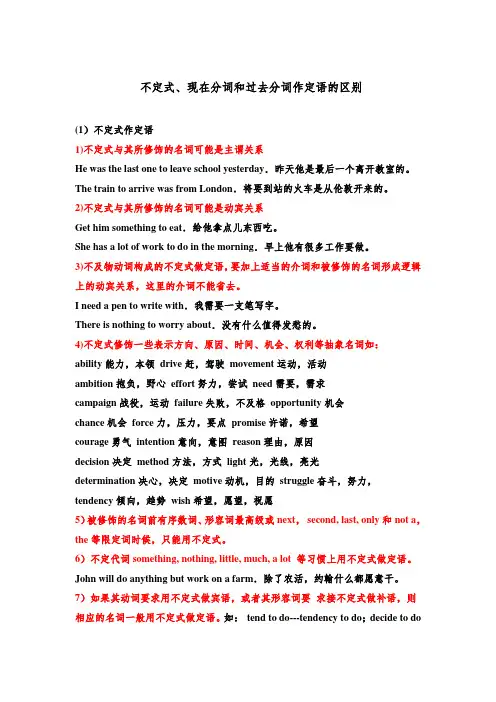
不定式、现在分词和过去分词作定语的区别(1)不定式作定语1)不定式与其所修饰的名词可能是主谓关系He was the last one to leave school yesterday.昨天他是最后一个离开教室的。
The train to arrive was from London.将要到站的火车是从伦敦开来的。
2)不定式与其所修饰的名词可能是动宾关系Get him something to eat.给他拿点儿东西吃。
She has a lot of work to do in the morning.早上他有很多工作要做。
3)不及物动词构成的不定式做定语,要加上适当的介词和被修饰的名词形成逻辑上的动宾关系,这里的介词不能省去。
I need a pen to write with.我需要一支笔写字。
There is nothing to worry about.没有什么值得发愁的。
4)不定式修饰一些表示方向、原因、时间、机会、权利等抽象名词如:ability能力,本领drive赶,驾驶movement运动,活动ambition抱负,野心effort努力,尝试need需要,需求campaign战役,运动failure失败,不及格opportunity机会chance机会force力,压力,要点promise许诺,希望courage勇气intention意向,意图reason理由,原因decision决定method方法,方式light光,光线,亮光determination决心,决定motive动机,目的struggle奋斗,努力,tendency倾向,趋势wish希望,愿望,祝愿5)被修饰的名词前有序数词、形容词最高级或next,second, last, only和not a,the等限定词时候,只能用不定式。
6)不定代词something, nothing, little, much, a lot 等习惯上用不定式做定语。
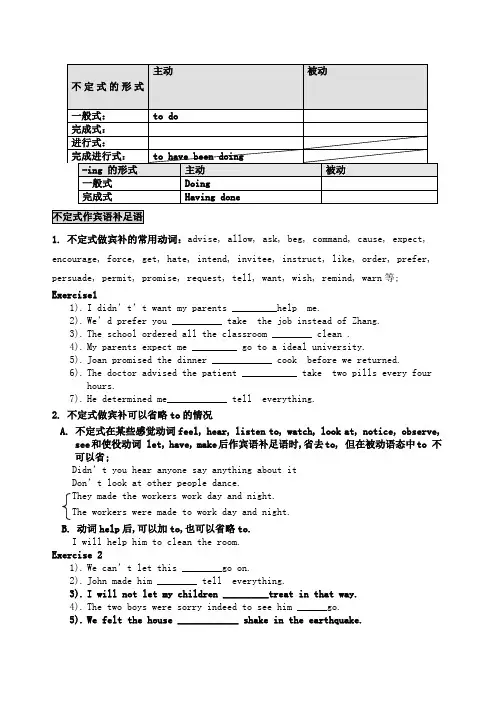
1. 不定式做宾补的常用动词:advise, allow, ask, beg, command, cause, expect, encourage, force, get, hate, intend, invitee, instruct, like, order, prefer, persuade, permit, promise, request, tell, want, wish, remind, warn等;Exercise11).I didn’t’t want my parents _________help me.2).We’d prefer you __________ take the job instead of Zhang.3).The school ordered all the classroom ________ clean .4).My parents expect me _________ go to a ideal university.5).Joan promised the dinner ____________ cook before we returned.6).The doctor advised the patient ___________ take two pills every fourhours.7).He determined me____________ tell everything.2. 不定式做宾补可以省略to的情况A. 不定式在某些感觉动词feel, hear, listen to, watch, look at, notice, observe,see和使役动词 let, have, make后作宾语补足语时,省去to, 但在被动语态中to 不可以省;Didn’t you hear anyone say anything about itDon’t look at other people dance.They made the workers work day and night.The workers were made to work day and night.B. 动词help后,可以加to,也可以省略to.I will help him to clean the room.Exercise 21).We can’t let this ________go on.2).John made him ________ tell everything.3).I will not let my children _________treat in that way.4).The two boys were sorry indeed to see him ______go.5).We felt the house ____________ shake in the earthquake.6).Do you like listening to other people ______ talk Have you ever heard him______ tell a lie7).I heard somebody ___________talk in the meeting room when I passed by.8).Who would you like to have________ go9).I’ve heard the song ________ sing many times.10).We saw the house _________ burn to the ground when we reached there.动词-ing经常用在动词_________________________________________________________ _______________________________等后做宾补,和宾语存在着逻辑上的主谓关系,且表示动作___________ 进行,状态正在持续;She kept me waiting for almost an hour.When he passed the bank, he saw the thief stealing some money from the bank.过去分词通常用在一些感觉动词和使役动词的宾语后面,强调它的动作性,和宾语是动宾关系;I had/go a decayed朽了的 tooth pulled off 我让大夫把我的一颗蛀牙拔了;主语谓语宾语宾补1. have/get +过去分词的用法过去分词在动词have, get两个词后面做宾补时,常常表示这个动作不是由__________完成的, 而是由__________完成的;You’d better have/get the dangerous building pulled down.How often do you have/get your hair cutWe had some pictures taken in the park.Have/get + 过去分词还可以表示这是主语的一种经历,需要根据上下文来领会句子的意义;I had my left arm broken yesterday.Li Ming had his bike stolen.make onself+过去分词的用法I can’t make myself understood because of my poor English.I didn’t make myself heard because a lot of people cried in the hall大厅.A liar骗子 can not make himself believed.Exercise 1 分析下列句子:1 I heard someone calling me.I heard my name called.2 I found Tom break the window.I found the window broken.3. Where did you get your book printed4. We have our classroom cleaned after school every day.5. We had better work harder to get the work done on time.6Can you smell the food burnt7The speaker raised his voice but still couldn’t make himself heard.8While you were out, you should keep your doors and windows closed.不定式、现在分词、过去分词作宾语补足语的区别:Sb.+ 动词 + sb/sth do+ sb/sth doing sth.+ sth/sb. done例如:see him go to schoolsee the fire burningsee the house burnt downExercise 2 选词完成句子;1).When he entered the room, he found the window __________ breaking, broken.2).I’ll have my bike _________ fixed, fixing修理 while you are cooking.3).I don’t want any bad words _________ said, saying about him behind hisback.4).Please get the work __________ done, doing as soon as possible.5).I’ll have the materials ___________ sent, sending to you next Mondaymorning.6).She won’t have her long and beautiful hair __________ cut, cutting short.7).You should make your voice ____________ heard, hearing.8).I want you to keep me __________ informing, informed of how things aregoing with you.9).The price is fine with me. How would you like it _________ paid, paying10).At last I succeeded in making myself ____________ understood,understanding.Exercise 3 用所给词的正确形式填空;1).I used to see these boys _____________ play on the playground.2).I saw them ____________ play the computer this afternoon.3).Have you __________ hear this song __________ sing before4).She was surprised to find the house ___________ break into when she wentback home.5).Unfortunately, he got his wallet ____________ steal on the bus.6).He won’t have us ____________ criticize批评 him.7).It’s a bad habit to leave the work __________ undo .8).Yesterday I caught him __________ take my dictionary when I went into theclassroom.Exercise 4利用语法知识,根据所给的提示语造句;例: We are having the house painted the house / paint at the moment.1.I lost my key. I’ll have to ________________________ another key / make.2.When was the last time you ___________________________ your hair / cut3.You look different. _____________________________________ you / your hair/ cut4._______________________________ you / a newspaper / deliver to your houseor do you go to the shop to buy one5.A: What are those workmen doing in your gardenB: Oh, we ______________________________ a swimming pool / build.6.A: Can I see the photographs you took when you were on holidayB: I’m afraid I __________________________ not / the film / develop yet.7.This coat is dirty. I must ________________________ it / clean..Exercise 6 语法填空1. Mr Smith didn’t go to the party because he had a lot of experiments _____do.2. ---Excuse me sir, where is Room 301--- Just a minute. I’ll have Bob ______ show you to your room.3. Our manager is going to have a new factory _______ build on the ruined one.4. My advisor encouraged me ________take a summer course to improve my writing skills.5. I smell something ________ burn in the kitchen. Can I call you back in a minute6. Jenny hopes that Mr. Smith will suggest a good way to have her written English___________ improve in a short period.7. He is very popular among his students as he always tries to make them _______interest in his lessons.复习:1.The government plans to bring in new laws _______ parents to take more responsibilityfor the education of their children.A.ForcedB. forcingC. to be forcedD. having forced2.It is one of the funniest things ________ on the internet so far this year.A.FindingB. being foundC. to findD. found3.- Can those ________ at the back of the classroom hear me-No problem.A.SeatB. sitC. seatedD. sat4.The trees _________ in the storm have been moved off the road.A.Being blown downB. blown downC. blowing downD. to blow down5.– The last one ________ pays the meal.-AgreedA.ArrivedB. arrivesC. to arriveD. arriving6.At the beginning of class, the noise of desks ________ could be heard outside theclassroom.A.Opened and closedB. to be opened and closedC. being opened and closedD. to open and close32. The town hall ________ in the 1800’s was the most distinguished building at that time.A. to be completedB. having been completedC. completedD. being completed33. “Things ________ never come again” I couldn’t help talking to myself.A. lostB. losingC. to loseD. have lostBDCBC CCA。

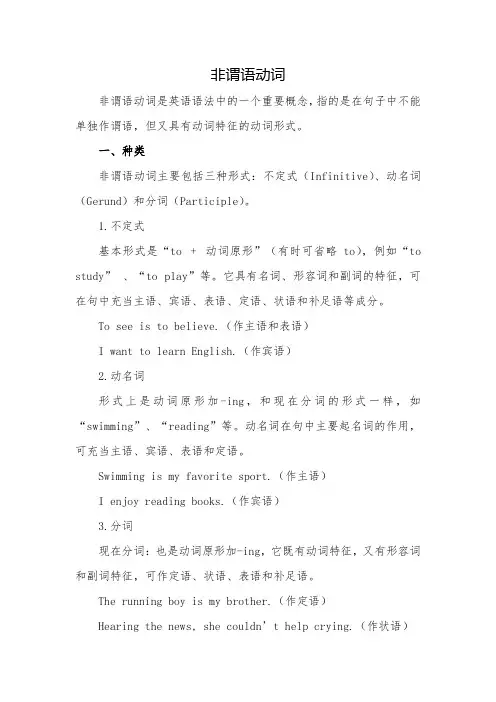
非谓语动词非谓语动词是英语语法中的一个重要概念,指的是在句子中不能单独作谓语,但又具有动词特征的动词形式。
一、种类非谓语动词主要包括三种形式:不定式(Infinitive)、动名词(Gerund)和分词(Participle)。
1.不定式基本形式是“to + 动词原形”(有时可省略to),例如“to study”、“to play”等。
它具有名词、形容词和副词的特征,可在句中充当主语、宾语、表语、定语、状语和补足语等成分。
To see is to believe.(作主语和表语)I want to learn English.(作宾语)2.动名词形式上是动词原形加-ing,和现在分词的形式一样,如“swimming”、“reading”等。
动名词在句中主要起名词的作用,可充当主语、宾语、表语和定语。
Swimming is my favorite sport.(作主语)I enjoy reading books.(作宾语)3.分词现在分词:也是动词原形加-ing,它既有动词特征,又有形容词和副词特征,可作定语、状语、表语和补足语。
The running boy is my brother.(作定语)Hearing the news, she couldn’t help crying.(作状语)过去分词:通常是动词原形加-ed(规则变化)或有其特殊的不规则变化形式,如“broken”、“written”等。
过去分词常表示被动或完成的意义,同样能充当定语、状语、表语和补足语等成分。
The broken cup is on the table.(作定语)Given more time, I can do it better.(作状语)二、用法区别1.作主语时不定式作主语常表示具体的某一次动作或行为,常用“It + be + 形容词+ (for/of sb.) + to do sth.”这样的结构,It is important for us to learn English well.动名词作主语往往表示抽象的、一般性的行为或概念。



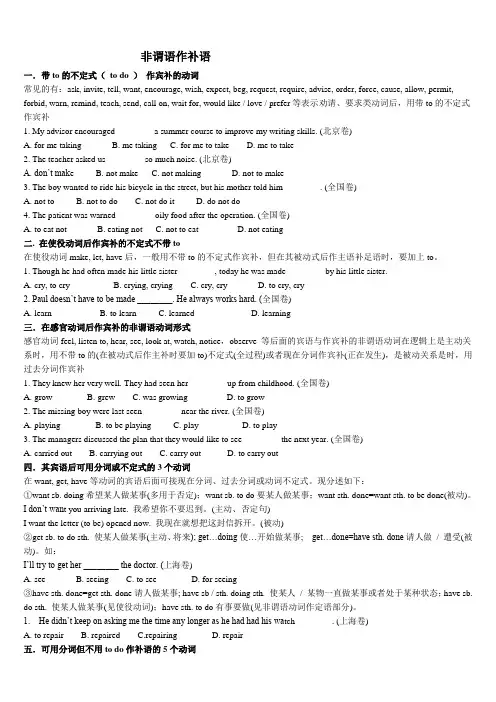
非谓语作补语一.带to的不定式(to do )作宾补的动词常见的有:ask, invite, tell, want, encourage, wish, expect, beg, request, require, advise, order, force, cause, allow, permit, forbid, warn, remind, teach, send, call on, wait for, would like / love / prefer等表示劝请、要求类动词后,用带to的不定式作宾补1. My advisor encouraged ________ a summer course to improve my writing skills. (北京卷)A. for me takingB. me takingC. for me to takeD. me to take2. The teacher asked us ________ so much noise. (北京卷)A. don’t mak eB. not makeC. not makingD. not to make3. The boy wanted to ride his bicycle in the street, but his mother told him ________. (全国卷)A. not toB. not to doC. not do itD. do not do4. The patient was warned ________ oily food after the operation. (全国卷)A. to eat notB. eating notC. not to eatD. not eating二. 在使役动词后作宾补的不定式不带to在使役动词make, let, have后,一般用不带to的不定式作宾补,但在其被动式后作主语补足语时,要加上to。
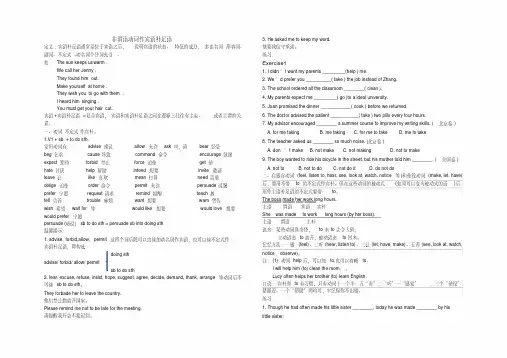
非谓语动词作宾语补足语定义:宾语补足语通常是位于宾语之后,说明宾语的状态、特征的成分,多由名词,形容词、副词、不定式,动名词个分词充当.如:The sun keeps us warm.We call her Jenny.They found him out.Make yourself at home.They wish you to go with them.I heard him singing.You must get your hair cut.宾语+宾语补足语=复合宾语,宾语和宾语补足语之间在逻辑上往往有主表、或者主谓的关系.一、动词不定式作宾补。
1.V1 + sb. + to do sth.常用动词有:advise 建议allow 允许ask 叫,请bear 忍受beg 乞求cause 导致command 命令encourage 鼓励expect 期待forbid 禁止force 迫使get 使hate 讨厌help 帮助intend 想要invite 邀请leave 让like 喜欢mean 打算need 需要oblige 迫使order 命令permit 允许persuade 说服prefer 宁愿request 请求remind 提醒teach 教tell 告诉trouble 麻烦want 想要warn 警告wish 希望wait for 等would like 想要would love 想要would prefer 宁愿persuade (劝说)sb to do sth = persuade sb into doing sth温馨提示:1.advise, forbid,allow, permit 这四个词后既可以直接加动名词作宾语,也可以接不定式作宾语补足语,即构成doing sthadvise/ forbid/ allow/ permitsb to do sth2.fear, excuse, refuse, insist, hope, suggest, agree, decide, demand, thank, arrange 等动词后不可接sb to do sth。
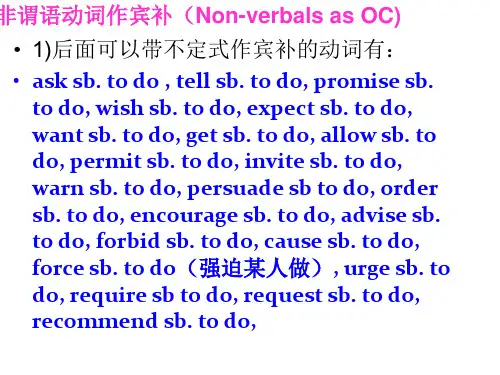
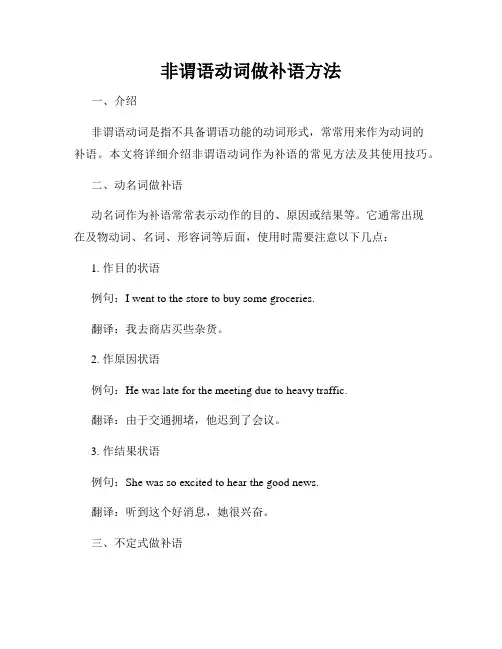
非谓语动词做补语方法一、介绍非谓语动词是指不具备谓语功能的动词形式,常常用来作为动词的补语。
本文将详细介绍非谓语动词作为补语的常见方法及其使用技巧。
二、动名词做补语动名词作为补语常常表示动作的目的、原因或结果等。
它通常出现在及物动词、名词、形容词等后面,使用时需要注意以下几点:1. 作目的状语例句:I went to the store to buy some groceries.翻译:我去商店买些杂货。
2. 作原因状语例句:He was late for the meeting due to heavy traffic.翻译:由于交通拥堵,他迟到了会议。
3. 作结果状语例句:She was so excited to hear the good news.翻译:听到这个好消息,她很兴奋。
三、不定式做补语不定式作为补语通常表示动作的目的、结果或方式等。
它通常出现在及物动词、名词、形容词等后面,并且可以根据句子结构的需要进行适当的变化。
1. 作目的状语例句:He stayed up all night to finish the report.翻译:为了完成报告,他整夜未眠。
2. 作结果状语例句:She worked hard to pass the exam.翻译:她努力学习以通过考试。
3. 作方式状语例句:The news shocked him to the extent that he couldn't speak.翻译:这个消息使他震惊得说不出话来。
四、现在分词做补语现在分词作为补语通常表示动作的主动、主观性和同时性。
它通常出现在及物动词、名词、形容词等后面,并且需要注意时态和人称的一致。
1. 作主动补语例句:I saw him standing at the bus stop.翻译:我看到他站在公交车站。
2. 作主观补语例句:She went to bed, feeling tired after a long day.翻译:经历了漫长的一天,她感到疲倦,上床睡觉了。
语法填空非谓语动词讲解非谓语动词是指在句子中作除谓语外的其他成分,包括动词不定式、动名词和分词。
非谓语动词在句子中可以充当主语、宾语、定语、状语等,并且可以与其他词性搭配使用,增强句子的表达力。
下面以动词不定式、动名词和分词三种形式的非谓语动词进行讲解。
1. 动词不定式动词不定式由“to + 动词原形”构成,常用作动词、名词、形容词和副词的补语。
用作动词补语:例1:I want to eat some fruits.(我想吃一些水果。
)例2:She seems to be very happy now.(她现在似乎很开心。
)用作名词补语:例3:Her goal is to become a doctor.(她的目标是成为一名医生。
)例4:The best way to learn English is to practice every day.(学习英语的最好方式是每天练习。
)2. 动名词动名词由动词的ing形式构成,常用作名词、主语、宾语、定语和状语的成分。
用作名词:例5:Reading is my favorite hobby.(阅读是我最爱的爱好。
)例6:I enjoy swimming in summer.(我喜欢夏天游泳。
)用作主语:例7:Dancing is good for health.(跳舞对健康有好处。
)例8:Running helps you lose weight.(跑步有助于减肥。
)用作宾语:例9:She enjoys painting beautiful landscapes.(她喜欢画美丽的风景。
)例10:I don't mind helping you with your homework.(我不介意帮你做作业。
)3. 分词分词有现在分词和过去分词两种形式,分别表示主动和被动的意义。
用作定语:例11:The boy playing basketball is my brother.(打篮球的男孩是我弟弟。
非谓语作补语总结非谓语是指在句子中充当动词不定式、分词、动名词等形式的词语。
作为补语,非谓语可以用来修饰或补充句子中的名词、代词、形容词等成分。
在英语语法中,非谓语作补语的使用非常广泛,本文将对非谓语作补语的用法进行总结,并提供一些实例。
1. 动词不定式作补语动词不定式作补语常常用来表示目的、结果、原因等意义。
它通常与感官动词、使役动词、情态动词、使动动词等词语结合使用。
(1) 不定式作目的补语不定式作目的补语时,常用结构为“动词 + to + 动词不定式”。
•I bought some flowers to decorate the room. (我买了些花来装饰房间。
)•She went to the park to have a picnic. (她去公园野餐。
)(2) 不定式作结果补语不定式作结果补语时,常用结构为“动词 + 动词不定式”。
•I was surprised to see her there. (看到她在那儿,我很惊讶。
)•He is happy to have such a good opportunity. (他很高兴有这么好的机会。
)(3) 不定式作原因补语不定式作原因补语时,常用结构为“It + be + 形容词 + for + 人/物 + to + 动词不定式”。
•It is difficult for me to understand the complex problem. (对于我来说,理解这个复杂的问题很难。
)•It is important for us to take care of the environment. (对于我们来说,保护环境很重要。
)2. 分词作补语分词作补语可以用来表示时间、原因、方式等。
分词作补语的形式有现在分词和过去分词两种。
(1) 现在分词作补语现在分词作补语通常用来表示主动、进行或正在进行的动作。
•He came in, carrying a big bag. (他走进来,拿着一个大包。
(完整版)非谓语动词作宾补的用法Unit 6 English Food: Grammar Object complementsTime: April 3rd Teacher: Zhu Zhouyue Class: Class4, Senior 2 Teaching aim:Master the different usage of the infinitive, the present participle and the past participle as the objective complements.Teaching methods:Inductive Method, PracticeTeaching procedures:Step1 Revision and Lead inRevise the general difference between the infinitive, the present participle and the past participle that we have learnt.Look at the following sentences, and find out the object complements in them and try to make comparison.a.Don’t make me do this or that. I’m too busy.b.The teacher told us not to read in the sun.c.I saw her dancing happily in the classroom.d.The manager wanted the letter typed at once.Today we are going to learn more details about the usage of the infinitive, the present participle and the past participle as the objective complements.Step2 Grammar非谓语动词作宾语补足语的用法及区别一、不定式作宾补1.常见的接带to的不定式作宾语补足语的动词:tell, ask, want, teach, allow, expect, get,等。
高考英语语法考点讲解与练习一、非谓语动词作定语【知识要点】1、非谓语动词包括四种:-to do不定式,-ing分词,-ed分词和动名词。
(重点为前三种)2、非谓语动词的词性及句法功能①-to do不定式相当于名词、形容词和副词,可以在句子中充当主语、宾语、表语、定语、状语和宾语补足语;②-ing分词相当于形容词和副词,可以在句子中充当表语、定语、状语和宾语补足语;③-ed分词相当于形容词和副词,可以在句子中充当表语、定语、状语和宾语补足语;④动名词相当于名词,可以在句子中充当主语、宾语、表语和定语。
3、前三种非谓语动词的形式与意义① -ing分词的基本意义为:主动或进行,变形有:进行式:doing被动式:being done完成式:having done完成被动式:having been done②-to do不定式的基本意义为:主动将来,变形有:进行式:to be doing被动式:to be done完成式:to have done完成被动式:to have been done③-ed分词表示被动或完成。
4、非谓语动词作定语由于三种非谓语动词都具有形容词的性质,所以它们都可以在句子中充当定语,并根据其在被修饰的名词中心词的前后位置,分为前置定语和后置定语两种。
the falling leaves (-ing分词作前置定语,“正在下落的叶子”)the leaves falling in the sky (-ing分词短语作后置定语,“正在空中下落的叶子”)the coming/following day (-ing分词作前置定语,“第二天”)the day to come (-to do分词短语作后置定语,“第二天”)the fallen leaves (-ed分词作前置定语,“已经落地的叶子/落叶”)the house burnt to the ground (-ed分词短语作后置定语,“被烧成废墟的房子”)【练习】单句语法填空1.Looking at the ______ (fall) leaves in the sky, he knows the fall is coming.2.Seeing the ______ (fall) leaves on the ground, he decided to do some sweeping first before sitting down to have a rest.3.It is said that the building ______ (build) here next year will be completed within one year.4.It is said that the building ______ (build) here now will be completed within one year.5.It is said that the building ______ (build) here last year will be rebuilt soon.6.The gentleman ______ (seat) next to Tom is his best friend.7.The gentleman ______ (sit) next to Tom is his best friend.8.The room was in a mass, with those ______ (break) furniture.9.The purely white snow looks like a beautiful blanket ______ (cover) the land.10.The police have got enough evidence ______ (prove) that he is guilty.11.Turn to the right and you will see a wide road ______ (lead) up to the building.12.If you get the first place, you will win an all expenses ______ (pay) journey.13.All the ______ (question) people supported the government’s latest policy.14.You should keep well the books ______ (borrow) from the library.15.Can those people ______ (seat) at the back hear me?二、非谓语动词作状语【知识要点】非谓语动词作状语由于三种非谓语动词都具有副词的性质,所以它们都可以在句子中充当状语。
Day 6非谓语动词作宾补、主语、表语精讲精练【非谓语动词作宾补】1.不定式作宾语补足语(1)带to的不定式作宾语补足语常见的有:ask,invite,want,encourage,wish,expect,beg,request,require,advise,order,force,cause,allow,permit,forbid,warn,remind,teach,send,call on,wait for,would like/love/prefer等表示劝告、建议、要求类动词。
Lily's parents want her to develop fully.莉莉的父母想让她全面发展。
As required,each student is expected to bring at least one book to share.根据要求,每个学生应带至少一本书来分享。
(2)不带to的不定式作宾语补足语常用动词(主动语态中)有:使役动词(make,let,have);感官动词(see,watch,observe,hear,notice)。
The complete failure made him give up for a while ,but he gathered himself up soon.这次彻底的失败让他放弃了一段时间,但是他很快又振作了起来。
2.现在分词作宾语补足语表示主动、进行。
常用现在分词作宾语补足语的有:feel,find,hear,notice,observe,see,watch,get,have,keep,leave,send,set,listen to,look at等。
I heard the clock striking eight when I woke up this morning.今天早上醒来时,我听见钟敲响八点。
His sudden departure left me losing interest in the band.他的突然离开让我对乐队失去了兴趣。
非谓语作补语一.带to的不定式(to do )作宾补的动词常见的有:ask, invite, tell, want, encourage, wish, expect, beg, request, require, advise, order, force, cause, allow, permit, forbid, warn, remind, teach, send, call on, wait for, would like / love / prefer等表示劝请、要求类动词后,用带to的不定式作宾补1. My advisor encouraged ________ a summer course to improve my writing skills. (北京卷)A. for me takingB. me takingC. for me to takeD. me to take2. The teacher asked us ________ so much noise. (北京卷)A. don’t mak eB. not makeC. not makingD. not to make3. The boy wanted to ride his bicycle in the street, but his mother told him ________. (全国卷)A. not toB. not to doC. not do itD. do not do4. The patient was warned ________ oily food after the operation. (全国卷)A. to eat notB. eating notC. not to eatD. not eating二. 在使役动词后作宾补的不定式不带to在使役动词make, let, have后,一般用不带to的不定式作宾补,但在其被动式后作主语补足语时,要加上to。
1. Though he had often made his little sister ________, today he was made ________ by his little sister.A. cry, to cryB. crying, cryingC. cry, cryD. to cry, cry2. Paul doesn’t have to be made ________. He always works hard. (全国卷)A. learnB. to learnC. learnedD. learning三.在感官动词后作宾补的非谓语动词形式感官动词feel, listen to, hear, see, look at, watch, notice,observe 等后面的宾语与作宾补的非谓语动词在逻辑上是主动关系时,用不带to的(在被动式后作主补时要加to)不定式(全过程)或者现在分词作宾补(正在发生),是被动关系是时,用过去分词作宾补1. They knew her very well. They had seen her ________ up from childhood. (全国卷)A. growB. grewC. was growingD. to grow2. The missing boy were last seen ________ near the river. (全国卷)A. playingB. to be playingC. playD. to play3. The managers discussed the plan that they would like to see ________ the next year. (全国卷)A. carried outB. carrying outC. carry outD. to carry out四.其宾语后可用分词或不定式的3个动词在want, get, have等动词的宾语后面可接现在分词、过去分词或动词不定式。
现分述如下:①want sb. doing希望某人做某事(多用于否定);want sb. to do要某人做某事;want sth. done=want sth. to be done(被动)。
I don’t wan t you arriving late. 我希望你不要迟到。
(主动、否定句)I want the letter (to be) opened now. 我现在就想把这封信拆开。
(被动)②get sb. to do sth. 使某人做某事(主动、将来); get…doing使…开始做某事; get…done=have sth. done请人做/ 遭受(被动)。
如:I’ll try to get her ________ the doctor. (上海卷)A. seeB. seeingC. to seeD. for seeing③have sth. done=get sth. done请人做某事; have sb / sth. doing sth. 使某人/ 某物一直做某事或者处于某种状态;have sb. do sth. 使某人做某事(见使役动词);have sth. to do有事要做(见非谓语动词作定语部分)。
1. He didn’t keep on asking me the time any longer as he had had his wa tch ________. (上海卷)A. to repairB. repairedC.repairingD. repair五.可用分词但不用to do作补语的5个动词Leave,keep, find等后可用现在分词(主动)或过去分词(被动)作补语,一般不用to do。
在catch(撞见), smell(闻到), 等后通常只接现在分词作补语,不用不定式或过去分词。
1. It was so cold that they kept the fire ________ all night. (全国卷)A. to burnB. burntC. burningD. burned2. A cook will be immediately fired if he is found ________ in the kitchen. (全国卷)A. smokeB. smokingC. to smokeD. smoked3. He looked around and caught a man ________ his hand into the pocket of a passenger. (安徽卷)A. putB. to be puttingC. to putD. putting4. The salesman scolded the girl caught ________ and let her off. (全国卷)A. to have stolenB. to be stealingC. to stealD. stealing5.Don’t leave the water ________ while you brush your teeth. (天津卷)A. runB. runningC. being runD. to run。
六.make oneself 后常用understood等过去分词作宾补make oneself understood / heard / seen / known让别人明白自己的意思/ 让自己讲的话被别人听到/ 让自己被别人看到/ 让自己被别人认识。
如:1. The speaker raised his voice but still couldn’t make himself ________. (全国卷)A. hearB. to hearC. hearingD. heard2. Helen had to shout ________ above the sound of the music. (广西卷)A. making herself hearB. to make herself hearC. making herself heardD. to make herself heard七.可用to be或to have done作补语的9个动词在表示“认为”的think, consider, believe, suppose, prove, find, understand, judge, imagine等动词后,可跟to be作补语(认为…是…),一般不跟to do;但在think, consider, believe等之后可跟to have done作补语(认为…做了…)。
如:Charles Babage is generally considered ________ the first computer. (全国卷)A. to have inventedB. inventingC. to inventD. having invented八.在be said / reported 等后用不定式在be said, be reported, be believed, be supposed, be thought等后面,以及要求接不定式。
1. He was reported to have broken the world record. 据报道他打破了世界纪录。
=It is reported that he has broken the world record.2. The flu is believed ____ by viruses that like to reproduce in the cells inside the human nose and throat. (上海卷) A. causeB. being causedC. to be causedD. to have caused3. Robert is said ________ abroad, but I don’t know what country he studied in. (全国卷)A. to have studiedB. to studyC. to be studyingD. to have been studying九.在介词with后作宾补的非谓语动词形式在with的宾语后,若用过去分词,表示宾语与过去分词在逻辑上是被动关系,且意味着该动作已经完成或;若用现在分词,表示宾语与现在分词在逻辑上是主动关系,且表示动作的持续进行;若用带to的不定式,则表示将来的动作,宾语与不定式在逻辑上可以是主动关系也可以是被动关系,注意此时的不定式不是作宾补而是作宾语的定语了。